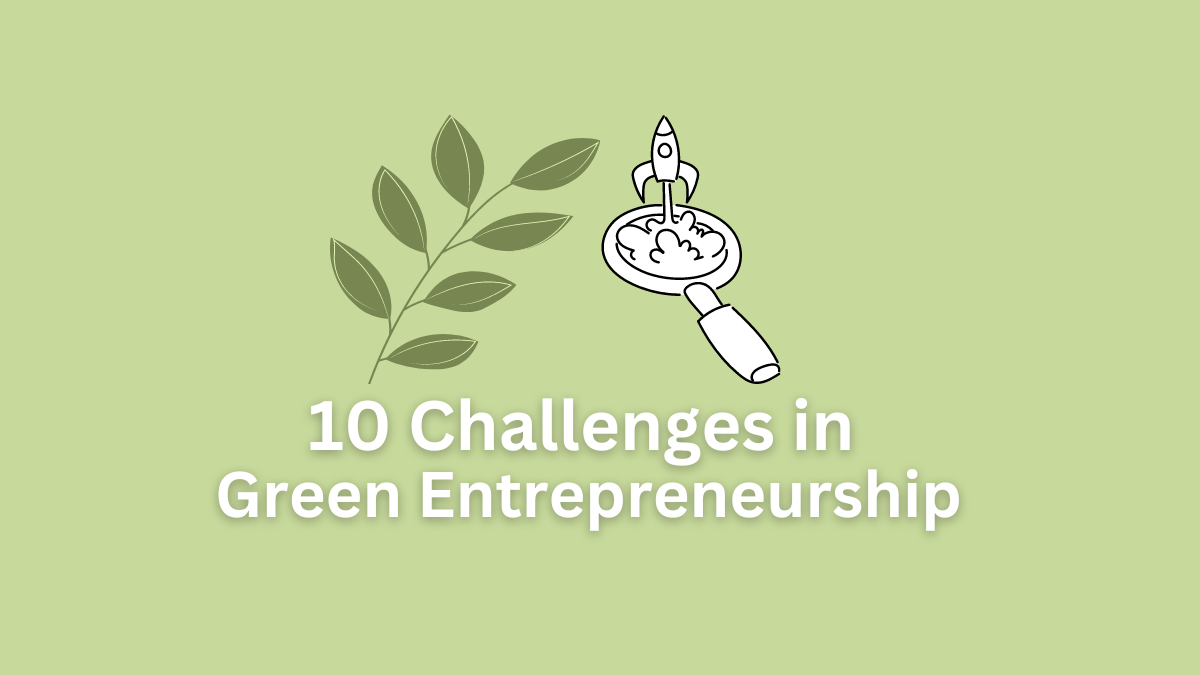Challenges in Green Entrepreneurship
Green entrepreneurship involves developing and implementing business ideas that address environmental and social challenges while fostering economic growth. It encompasses creating innovative solutions that minimize negative environmental impacts and promote sustainability.
Green entrepreneurs prioritize eco-friendly practices, products, and services, aiming to contribute to a cleaner and more sustainable future for generations to come. Here, we will explore the 10 challenges in green entrepreneurship and strategies to overcome them.
High Initial Costs
One of the primary challenges in green entrepreneurship is the high initial costs associated with implementing environmentally friendly practices and technologies. Strategies to overcome this challenge include seeking grants, subsidies, or financial incentives available for green initiatives.
Entrepreneurs can also consider partnering with investors or leveraging crowdfunding platforms to raise capital for their green ventures.
Limited Access to Funding
Green entrepreneurs often face difficulty in accessing traditional sources of funding due to the perceived higher risks associated with green businesses.
To overcome this challenge, entrepreneurs can explore alternative funding options such as impact investing, green bonds, or venture capital firms specializing in sustainability. Building a strong business case and demonstrating the potential for long-term profitability can also attract investors to green ventures.
Regulatory Barriers
Navigating complex and inconsistent regulatory environments can pose significant challenges for green entrepreneurs. To overcome this hurdle, entrepreneurs should stay informed about relevant environmental regulations and compliance requirements.
Building relationships with regulatory agencies and seeking guidance from legal experts can help entrepreneurs navigate regulatory barriers effectively.
Limited Market Awareness
Green products and services may face limited market awareness or consumer demand compared to conventional alternatives. To address this challenge, entrepreneurs can focus on educating consumers about the benefits of green products and the importance of sustainability.
Implementing effective marketing strategies, including targeted advertising and social media campaigns, can help raise awareness and generate demand for green offerings.
Read More: 10 Challenges in Social Entrepreneurship
Technological Obsolescence
Rapid advancements in technology can lead to the obsolescence of green technologies, posing challenges for entrepreneurs. To stay ahead of technological obsolescence, entrepreneurs should continuously monitor industry trends and invest in research and development to innovate and improve their products and services. Building partnerships with technology providers and investing in flexible, adaptable technologies can also mitigate the risk of obsolescence.
Supply Chain Complexity
Green entrepreneurs may face challenges in establishing sustainable supply chains due to the complexity of sourcing environmentally friendly materials and resources. Collaborating with suppliers committed to sustainability and ethical practices can help entrepreneurs build transparent and resilient supply chains. Implementing supply chain management systems and conducting regular audits can also ensure compliance with environmental standards.
Read More: 10 Challenges in HRM
Consumer Perception and Behavior
Changing consumer perceptions and behaviors towards green products and services can be a challenge for entrepreneurs.
To overcome this hurdle, entrepreneurs should focus on building trust and credibility by transparently communicating the environmental benefits of their offerings. Engaging in consumer education and advocacy initiatives can also influence consumer attitudes and preferences toward sustainability.
Competition from Conventional Businesses
Green entrepreneurs may face competition from conventional businesses offering cheaper or more established alternatives. To compete effectively, entrepreneurs should differentiate their offerings by emphasizing unique value propositions such as superior quality, environmental benefits, or social impact.
Building a strong brand identity and leveraging storytelling and branding techniques can help green entrepreneurs stand out in competitive markets.
Read More: 10 Challenges in Stable Entrepreneurship
Limited Networking Opportunities
Building a network of stakeholders, including investors, suppliers, and partners, can be challenging for green entrepreneurs, especially in niche markets.
To expand their network, entrepreneurs should actively participate in industry events, conferences, and networking groups focused on sustainability and environmental issues. Building strategic partnerships with like-minded organizations and leveraging online platforms for networking can also help entrepreneurs expand their reach.
Scaling Green Ventures
Scaling green ventures from startups to sustainable businesses can be challenging due to resource constraints and market uncertainties.
To overcome this challenge, entrepreneurs should focus on building scalable business models and investing in infrastructure and capacity-building initiatives. Seeking guidance from mentors, advisors, and industry experts can provide valuable insights and support in scaling green ventures effectively.
Hence, these are the 10 challenges in green entrepreneurship and relevant strategies to overcome them.
Read Next: 10 Challenges in Strategic Entrepreneurship
